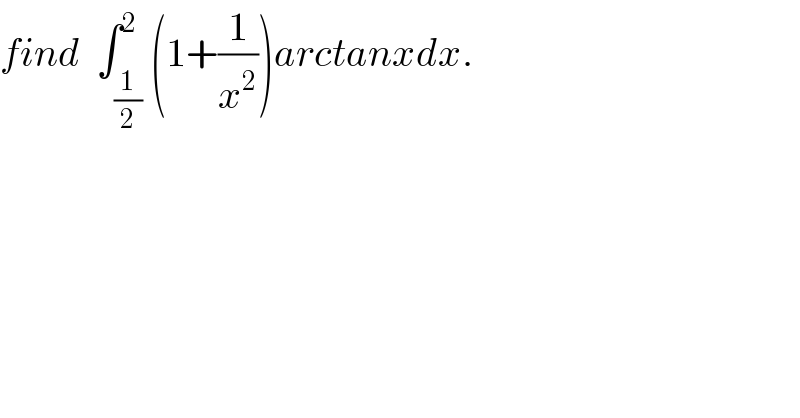
Question Number 28162 by abdo imad last updated on 21/Jan/18

$${find}\:\:\int_{\frac{\mathrm{1}}{\mathrm{2}}} ^{\mathrm{2}} \left(\mathrm{1}+\frac{\mathrm{1}}{{x}^{\mathrm{2}} }\right){arctanxdx}. \\ $$
Commented by abdo imad last updated on 23/Jan/18
![by parts u^, = 1+(1/x^2 ) and v= arctanx I= [(x−(1/x))arctanx]_(1/2) ^2 − ∫_(1/2) ^2 (x−(1/x)) (dx/(1+x^2 )) = (3/2)arctan2 −(−(3/2)arctan((1/2)))−∫_(1/2) ^2 ((xdx)/(1+x^2 )) +∫_(1/2) ^2 (dx/(x(1+x^2 ))) =((3π)/4) − (1/2)[ln(1+x^2 )]_(1/2) ^2 +∫_(1/2) ^2 (dx/(x(1+x^2 ))) = ((3π)/4) −(1/2)( ln(5)−ln((5/4)))+∫_(1/2) ^2 (dx/(x(1+x^2 ))) =((3π)/4) −1 + ∫_(1/2) ^2 (dx/(x(1+x^2 ))) let decompose F(x)= (1/(x(1+x^2 ))) = (a/x) + ((bx+c)/(1+x^2 )) a=lim_(x→0) xF(x)=1 and lim_(x→+∝) xF(x)=0=a +b ⇒b=−1 and F(x)= (1/x) +((−x+c)/(1+x^2 )) we look that c=0 ∫_(1/2) ^2 (dx/(x(1+x^2 ))) = ∫_(1/2) ^2 (dx/x) −(1/2)∫_(1/2) ^2 ((2dx)/(1+x^2 )) = 2ln2 −(1/2) [ln(1+x^2 )]_(1/2) ^2 = 2ln2 −1 so I= ((3π)/4) −1 +2ln2−1= ((3π)/4) +2ln2 −2 .](Q28290.png)
$${by}\:{parts}\:{u}^{,} =\:\mathrm{1}+\frac{\mathrm{1}}{{x}^{\mathrm{2}} }\:{and}\:{v}=\:{arctanx}\: \\ $$$${I}=\:\left[\left({x}−\frac{\mathrm{1}}{{x}}\right){arctanx}\right]_{\frac{\mathrm{1}}{\mathrm{2}}} ^{\mathrm{2}} \:\:−\:\int_{\frac{\mathrm{1}}{\mathrm{2}}} ^{\mathrm{2}} \left({x}−\frac{\mathrm{1}}{{x}}\right)\:\frac{{dx}}{\mathrm{1}+{x}^{\mathrm{2}} } \\ $$$$=\:\frac{\mathrm{3}}{\mathrm{2}}{arctan}\mathrm{2}\:−\left(−\frac{\mathrm{3}}{\mathrm{2}}{arctan}\left(\frac{\mathrm{1}}{\mathrm{2}}\right)\right)−\int_{\frac{\mathrm{1}}{\mathrm{2}}} ^{\mathrm{2}} \:\:\:\frac{{xdx}}{\mathrm{1}+{x}^{\mathrm{2}} }\:+\int_{\frac{\mathrm{1}}{\mathrm{2}}} ^{\mathrm{2}} \:\:\frac{{dx}}{{x}\left(\mathrm{1}+{x}^{\mathrm{2}} \right)} \\ $$$$=\frac{\mathrm{3}\pi}{\mathrm{4}}\:−\:\frac{\mathrm{1}}{\mathrm{2}}\left[{ln}\left(\mathrm{1}+{x}^{\mathrm{2}} \right)\right]_{\frac{\mathrm{1}}{\mathrm{2}}} ^{\mathrm{2}} \:\:\:+\int_{\frac{\mathrm{1}}{\mathrm{2}}} ^{\mathrm{2}} \:\:\:\frac{{dx}}{{x}\left(\mathrm{1}+{x}^{\mathrm{2}} \right)} \\ $$$$=\:\frac{\mathrm{3}\pi}{\mathrm{4}}\:−\frac{\mathrm{1}}{\mathrm{2}}\left(\:{ln}\left(\mathrm{5}\right)−{ln}\left(\frac{\mathrm{5}}{\mathrm{4}}\right)\right)+\int_{\frac{\mathrm{1}}{\mathrm{2}}} ^{\mathrm{2}} \:\:\:\:\frac{{dx}}{{x}\left(\mathrm{1}+{x}^{\mathrm{2}} \right)} \\ $$$$=\frac{\mathrm{3}\pi}{\mathrm{4}}\:−\mathrm{1}\:+\:\:\int_{\frac{\mathrm{1}}{\mathrm{2}}} ^{\mathrm{2}} \:\:\:\:\frac{{dx}}{{x}\left(\mathrm{1}+{x}^{\mathrm{2}} \right)}\:\:{let}\:{decompose} \\ $$$${F}\left({x}\right)=\:\:\frac{\mathrm{1}}{{x}\left(\mathrm{1}+{x}^{\mathrm{2}} \right)}\:=\:\frac{{a}}{{x}}\:+\:\:\frac{{bx}+{c}}{\mathrm{1}+{x}^{\mathrm{2}} } \\ $$$${a}={lim}_{{x}\rightarrow\mathrm{0}} \:{xF}\left({x}\right)=\mathrm{1}\:{and}\:\:{lim}_{{x}\rightarrow+\propto} \:{xF}\left({x}\right)=\mathrm{0}={a}\:+{b} \\ $$$$\Rightarrow{b}=−\mathrm{1}\:\:{and}\:\:{F}\left({x}\right)=\:\frac{\mathrm{1}}{{x}}\:+\frac{−{x}+{c}}{\mathrm{1}+{x}^{\mathrm{2}} }\:\:{we}\:{look}\:{that}\:{c}=\mathrm{0} \\ $$$$\int_{\frac{\mathrm{1}}{\mathrm{2}}} ^{\mathrm{2}} \:\:\frac{{dx}}{{x}\left(\mathrm{1}+{x}^{\mathrm{2}} \right)}\:=\:\int_{\frac{\mathrm{1}}{\mathrm{2}}} ^{\mathrm{2}} \:\frac{{dx}}{{x}}\:\:−\frac{\mathrm{1}}{\mathrm{2}}\int_{\frac{\mathrm{1}}{\mathrm{2}}} ^{\mathrm{2}} \:\:\:\frac{\mathrm{2}{dx}}{\mathrm{1}+{x}^{\mathrm{2}} } \\ $$$$=\:\mathrm{2}{ln}\mathrm{2}\:−\frac{\mathrm{1}}{\mathrm{2}}\:\left[{ln}\left(\mathrm{1}+{x}^{\mathrm{2}} \right)\right]_{\frac{\mathrm{1}}{\mathrm{2}}} ^{\mathrm{2}} =\:\mathrm{2}{ln}\mathrm{2}\:−\mathrm{1}\:\:{so} \\ $$$${I}=\:\frac{\mathrm{3}\pi}{\mathrm{4}}\:−\mathrm{1}\:+\mathrm{2}{ln}\mathrm{2}−\mathrm{1}=\:\frac{\mathrm{3}\pi}{\mathrm{4}}\:+\mathrm{2}{ln}\mathrm{2}\:−\mathrm{2}\:. \\ $$
